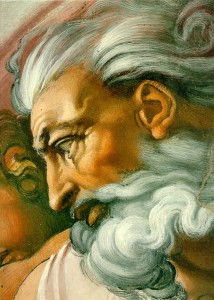 God is unknowable – stop looking for him, and you will find faith
God is unknowable – stop looking for him, and you will find faith
By David Bryant, Tuesday 8 January 2013 04.00 EST
“Have you found God?” The doorstep caller, neatly suited, briefcase in hand, did not prevaricate. My answer was equally blunt and occasioned him surprise for I was wearing a dog collar. “No.” The interview terminated abruptly leaving questions dancing in the air. Did this mean I had lost my faith? Was I hellbent, even? It was the formulation of his question that raised my hackles. It implied that God was a comprehensible being awaiting discovery. Scratch the surface of existence persistently enough and he will be revealed.
This is dangerous ground. If we envisage God as a person clothed with epithets such as powerful, loving, just, fear-inspiring and omnipotent we are creating a manmade image. Sigmund Freud points this out in his book, The Future of an Illusion. “Religion comprises a system of wishful illusions together with a disavowal of reality.” In other words we have an innate tendency to invent the particular God that suits our needs. Ironically this is precisely what the second commandment fulminates against. A paradox lies at the heart of the doorstep caller’s question. The more you claim to know God and attempt to delineate his nature the less likely you are to have hit the bull’s eye.
It is only possible to escape from this impasse by re-orienteering our thought forms. Faith is not the progressive unearthing of God’s nature but a recognition that he/she is fundamentally unknowable. The signpost points not to growing certainty but towards increasing non-knowing. This is not as outrageous as it seems. An apophatic thread, a belief that the only way to conceive of God is through conceding that he is ineffable, runs throughout Christian history. Jan Van Ruysbroeck, the 14th century Augustinian and man of prayer, maintained that “God is immeasurable and incomprehensible, unattainable and unfathomable”. St John of the Cross, one of the pillars of western mysticism, put it even more succinctly: “If a man wishes to be sure of the road he travels on, he must close his eyes and walk in the dark.”
This redirectioning of the spiritual path has fruitful offshoots. We no longer have to ask why God orders the world in such an unsatisfactory way, allowing cancer cells and war to proliferate. Nor do we have to bombard him with prayer in order to achieve our desired ends. Such dialogue is only sustainable if you posit a personal being.
Is anything left or does this destroy the very fabric of spirituality? What remains is a Quakerlike silence during which we can respond to the numinous, develop our perceptions, hone our morality and enhance our wonder at the staggering complexity of the universe. Instead of ranting at the arbitrariness and high-handed conduct of the God we have invented, it is now possible to rest in a cloud of unknowing which gives us time and space in which to reflect on the fundamental questions of life. Why am I here? How can I best deport myself in this bewildering world?
At first sight this is a distinctly uncomfortable stance. It leaves us rudderless in a sea of uncertainty. All the old props of a father God, prayer as colloquy with a personal deity and faith as a clear-cut assent to a set of credal formulations has been deconstructed and abandoned.
Persist and the rewards are immense. There is an exhilarating sense of newfound freedom. It releases us from the burden of kowtowing to the dictates of a holy book and it relieves us of the intellectual difficulties of accepting the dogmatic assertions of an ecclesiastical hierarchy. We are liberated and can follow our own spiritual path. Thomas Merton, the Trappist monk, spent a lifetime doing just this and found it uncovered an oasis of calmness and peace. “Follow my ways and I will lead you to golden-haired suns, Logos and music, blameless joys, Innocent of questions and beyond answers: For I, Solitude, am thine own self: I, Nothingness, am thy All. I Silence, am thy Amen!” Give it a whirl. I might just free you from the shackles of orthodoxy and kickstart your spiritual life.
http://www.guardian.co.uk/commentisfree/belief/2013/jan/08/god-unknowable-faith or http://bit.ly/WHiHDV
Image is detail from Michelangelo’s “Creation of Adam” in the Sistine Chapel.

1 comments
I like this – It makes sense and is a refreshing way to look at life and the Universe.